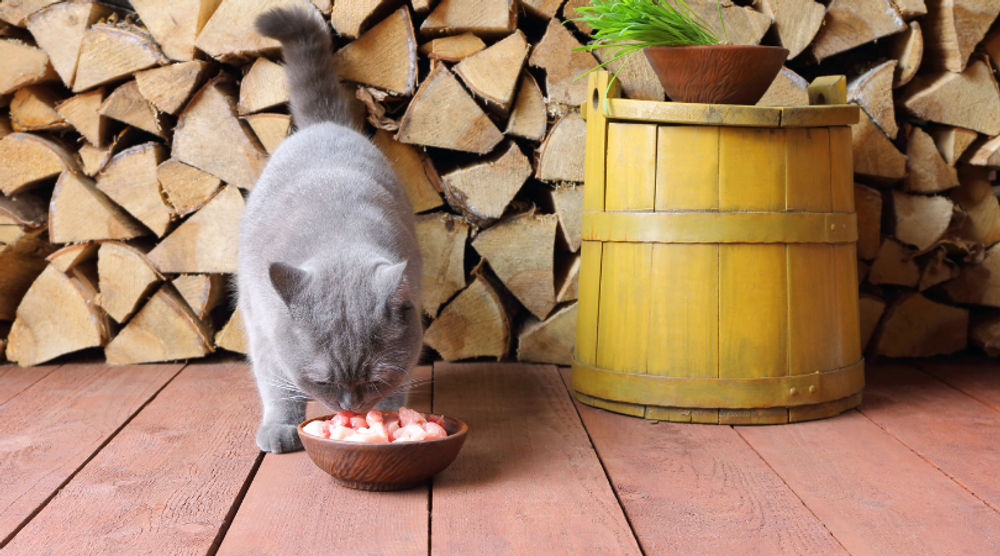What is a Healthy Cat Diet?
Jan 18, 2018
Please consider that your feline 'Fur Child' is a obligate carnivore. Cats have a body that is designed for tearing, ripping and digesting raw meat. Not kibble or canned cooked meat mixed with fillers etc.
Commercially produced cat foods are creating a population of diseases and ill health in our carnivore felines.
Cats need raw meat to thrive.
I deeply considered this quote that Dr. Patricia Jordan, an
animal naturopath, has on her website:
“When our animals get sick, we don't ask what THEY did wrong, we ask what WE did wrong."
~Joel Salatin of Polyface Farms
What is an
Obligate Carnivore?
An obligate carnivore is an animal that actually has a genetic structure that by the laws of nature make it mandatory for them to eat the flesh of animals in order to thrive.
Obligate carnivores can and sometimes do eat other types of non-flesh foods, including vegetables, grasses or fruit- even grains or legumes when offered it, but they must consume meat as the main source of their diet or they will not thrive and be as healthy as they were meant to be.
Many carnivores are forced to survive on foods with grains and vegetables. They have to when that is the only choice they are given. Unfortunately they have also suffered the consequences and can end up with diseases in later life that many humans suffer from eating the wrong diet.
Meat Is An Essential Need for The Survival Of Cats
Our cats are most definitely obligate carnivores. Felines cannot digest and should not be fed plant-based foods. Neither can plant-based foods give your kitty cat the nutrients they need. Being an obligate carnivore means that cats have to eat meat in order to survive.
Linda Zurich says in her popular book, Raw Fed Cats “Many of us, although we may have had cats as pets for most if not all of our lives, have failed to realize one very important thing about them – the fact that all cats are, by their very nature, born carnivores. Indeed cats are actually obligate carnivores, which essentially means that the nutrition they require to thrive must come from the meat, organs and bones of the bodies of other animals. And because of the cat’s particular anatomical and physiological design, the most ideal and natural way for them to consume that flesh and bone is in its raw state. This really does make very good sense once we stop to think about it. Because what other feline – much less any other carnivore in the world - ever consumes its prey cooked? The answer of course is that in Nature, this simply does not occur. Eating cooked food is not truly natural for cats, but eating raw food is!”
One of the primary amino acids missing in plants is taurine, which cats cannot live without it, Taurine is found in animal muscle meat, and in the heart and in liver.
Taurine deficiency has been known to cause some very serious health conditions in cats, including more cardiovascular disease and blindness.
Also our pet cats don’t have the ability to change the beta-carotene in plants material like dark green vegetables and carrots, squash etc. into they type of vitamin A they so need. What felines require is the kind of pre-formed ‘A’, that is only found in liver and fish oils.
Many cat owners have fed their felines a vegan or vegetarian diet some that include adding milk or egg products and then supplementing with taurine and other needed nutrients. However we really have to think about using supplementation in this way. How can artificial supplements possibly make up for all the nutrients missing from a raw diet?
Our kitty cats are just not made to eat those carbohydrates their little feline bodies just aren’t made to – they are missing the enzymes required to digest fruits, grains and vegetables. The only types of carbohydrates that a feral feline, in nature may eat is grass- or they do sometimes eat the stomach contents that has been pre-digested in let’s say a mouse, a bird or a rat.
Cats are just not designed to eat vegetables, grains or carbohydrates at all. They are even more so, than dogs strictly meat eaters.
"If yr cat has been eating a steady diet of commercial junk food his entire life, it’s important to realize up front that transitioning him to a raw diet might take some time as well as some persistence, perseverance, and above all, a good bit of patience on your part.
And then again, it might not. :-)
Each cat is different. Some will take to raw as if they’ve simply been waiting their whole lives for their humans to figure out what they really should have been feeding them all along. For these cats, the transition to raw is relatively simple, quick and easy. Other cats may be a bit slower to make the switch, and still other cats may take even longer, particularly if they’re older or perhaps more set in their ways. Cats that have become very addicted to the carbohydrates in low quality kibble or canned cat food are the ones that may take the longest time to transition to an all raw diet. These are cats that will require a bit more determination and effort on your part to help them make the switch to raw. But please rest assured, this transition can and will happen, as long you’re ready and willing to do your part. All it takes is a firm but gentle resolve and some patience on your part, along with as much time as your cat needs to get with the program."

